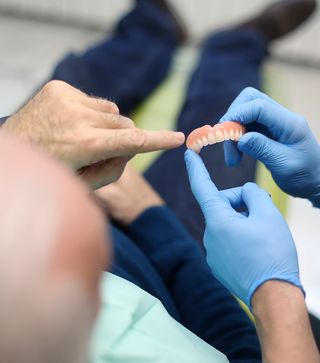
Fixed dentures
Fixed dentures (aka crown and bridges dentures) are made from crowns that are fixed to the existing teeth in the upper or lower arch, and are made to resemble the missing teeth. They are more costly than removable dentures, but are more stable and durable long-term, and feel like real teeth. Dr. Jason Gray & Dr. Alison Robinson can help determine if a fixed denture would be suitable for you.
Causes of loose dentures
Loose Dentures are a common problem for people who have been wearing complete or full dentures over a long period of time.
Loose dentures can occur over time due to normal wear and tear, or because of the continued compression of the denture against the tissue that holds the gum and bone.
This compression can gradually recede or shrink the volume of the gum ridges and bone, causing the dentures to become loose. Left unchecked, loose dentures can cause sores, infections and other oral health problems, which is why it is important to get checked out by a dentist as soon as possible.
Treatments for loose dentures
There are three main treatments for loose dentures: relining or refitting dentures, making new dentures, or, in some cases, implant-retained dentures may even be an option.
In order to determine the appropriate treatment it is necessary to make an appointment with Dr. Jason Gray or Dr. Alison Robinson, as there are many factors to be taken into consideration in deciding which course of treatment will be in your best interests.
Temporary denture relining involves adding a layer of filler under the denture while it is in your mouth. This material then hardens and fills the gap created by the receding tissue, making your dentures fit snugly again. This treatment can be done in the dentist chair on the same day, but is usually a temporary measure.
For a more permanent reline a similar process takes place to create a mould, but your denture will be sent away for a day or so to a laboratory where the filler material will be made out of a more durable plastic.
What are the benefits of fixing loose dentures?

Implant retained overdentures
Implant retained overdentures are used for people who do not have any teeth remaining in the jaw for a fixed denture to attach to. Instead, implant retained overdentures attach to the bone in the jaw, providing there is sufficient bone to support the implants.
A consultation with either Dr. Gray or Dr. Robinson is required in order to determine if you are a suitable candidate for this procedure.
How do Implant Retained Overdentures work?
Implant retained overdentures are made of an acrylic base that is designed to look like gums. Teeth made of acrylic or porcelain are attached to the base. At least two implants are inserted into your jaw for support and these are attached to the denture with clip or stud attachments.
How do I care for my Implant Retained Overdenture?
In order to preserve the healthy condition of your dentures, regular cleaning is essential. We recommend that you remove your overdentures at night to prevent infections developing, and because, just as with regular dentures, you should not sleep with the implant-supported dentures in place.
Once removed clean your denture with a denture brush and cream, and leave to soak overnight in a denture soaking solution or cold water. Do not use hot water as this may cause your dentures to warp.
Frequently asked questions
Fixed dentures are designed to resemble the missing teeth and have a very natural look. However you may find it will take a couple of days to adjust to the change.
Generally, if anything, fixed dentures will help improve your smile and facial appearance by filling out your face and profile.
Eating will take a little practice at first. For the first few days afterwards, start with soft foods and small bite-sized pieces. Avoid hot foods and chew foods gently using both sides of the mouth at the same time.


